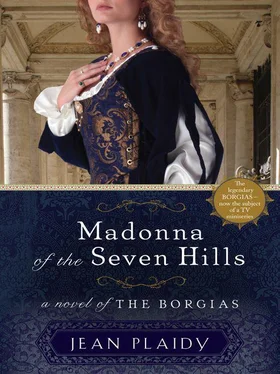Виктория Холт - Madonna of the Seven Hills
Здесь есть возможность читать онлайн «Виктория Холт - Madonna of the Seven Hills» весь текст электронной книги совершенно бесплатно (целиком полную версию без сокращений). В некоторых случаях можно слушать аудио, скачать через торрент в формате fb2 и присутствует краткое содержание. Жанр: Исторические любовные романы, на английском языке. Описание произведения, (предисловие) а так же отзывы посетителей доступны на портале библиотеки ЛибКат.
- Название:Madonna of the Seven Hills
- Автор:
- Жанр:
- Год:неизвестен
- ISBN:нет данных
- Рейтинг книги:4 / 5. Голосов: 1
-
Избранное:Добавить в избранное
- Отзывы:
-
Ваша оценка:
- 80
- 1
- 2
- 3
- 4
- 5
Madonna of the Seven Hills: краткое содержание, описание и аннотация
Предлагаем к чтению аннотацию, описание, краткое содержание или предисловие (зависит от того, что написал сам автор книги «Madonna of the Seven Hills»). Если вы не нашли необходимую информацию о книге — напишите в комментариях, мы постараемся отыскать её.
Madonna of the Seven Hills — читать онлайн бесплатно полную книгу (весь текст) целиком
Ниже представлен текст книги, разбитый по страницам. Система сохранения места последней прочитанной страницы, позволяет с удобством читать онлайн бесплатно книгу «Madonna of the Seven Hills», без необходимости каждый раз заново искать на чём Вы остановились. Поставьте закладку, и сможете в любой момент перейти на страницу, на которой закончили чтение.
Интервал:
Закладка:
The nuns of San Sisto quickly learned to love their little pupil, not only for her pleasant looks and charming manners, but because of that eager desire within her to please everybody and be their friend; and perhaps also they remembered it was rumored that she was indeed the daughter of the great Roderigo Borgia, the richest of Cardinals and one who, it was said in high places, had every chance of one day becoming Pope.
When Lucrezia had been three years at Monte Giordano, Ludovico, Adriana’s husband, died and the palace was plunged into mourning, Adriana covered herself with black veils and spent much time with her priests, and Lucrezia told herself then that Adriana was a very good woman.
One day when Lucrezia had returned from San Sisto’s to Monte Giordano and sat at table with Adriana and Orsino she thought how sad it was that she and Orsino should eat and drink from silver utensils while Adriana, because she was a widow, mourning her husband in the Spanish manner, must do so from earthenware.
Lucrezia leaned on the table, the top of which was made of marble and colored pieces of wood, and said: “Dear Madonna Adriana, you are still very unhappy because you are a widow. I know, because my mother was unhappy when Giorgio di Croce died. She wept and talked of her unhappiness, and then she felt better.”
Adriana straightened the long black veil which flowed over her shoulder. “I would not talk of my grief,” she said. “In Spain we say it is ill-mannered to show one’s grief to the world.”
“But we are not the world—Orsino and I,” persisted Lucrezia. “And my mother …”
“Your mother was an Italian woman. It will be well if you forget your Italian birth. In Spain to share a pleasure is a good thing because in sharing what is good one gives something worth having. To share one’s sorrow is to beg that one’s burden shall be partly carried by another. Spaniards are too proud to ask favors.”
The matter was closed. Lucrezia blushed over her plate. She had much to learn, she realized. She was sorry she had spoken, and now she looked pleadingly at Orsino for comfort; but he was not looking at her. Orsino was one of the few people who did not admire her yellow hair and pretty face. She might have been one of the ornamental chairs, of which there were so many in the principal rooms of the palace, for all the notice he took of her.
Adriana was looking severe, and Lucrezia feared that she would always disappoint her because she was such a good woman and thought always of doing what was right.
Later that day, as she and Adriana sat together working on an altar cloth, Adriana said: “You will soon have a companion to share your dancing and music lessons.”
Lucrezia dropped the gold thread and waited breathlessly.
“I am to have a daughter,” said Adriana.
“Oh, but … a daughter! I thought …” Lucrezia at nine years of age was knowledgeable. She had seen certain sights from the house on the piazza; she had listened to the talk of her brothers and the servants. It seemed incredible that the pious widow could have a daughter.
Adriana was looking at her in surprise, and Lucrezia flushed again.
“My son is of a marriageable age,” said Adriana coldly. “His bride will soon be coming here. She will live with us as my daughter until the marriage takes place.”
Lucrezia picked up her needle and began to work, hoping to hide her embarrassment. “That will be pleasant, Madonna Adriana,” she said, but she felt sorry for the girl who would be married to Orsino.
“Orsino,” said Adriana as though reading her thoughts, “is one of the best matches in Rome.”
“Is Orsino happy?” asked Lucrezia. “Is he dancing with joy because he is to have a bride?”
“Orsino has been brought up as a Spanish nobleman. They, my dear Lucrezia, do not jump for joy like any Italian shepherd on the Campo di Fiore.”
“Assuredly they do not, Madonna Adriana.”
“He will be happy. He knows his duty. He must marry and have sons.”
“And the bride.…”
“You will soon see her. I shall teach her as I do you.”
Lucrezia continued to stitch, thinking of the companion she was to have. She hoped the bride would not mind too much … having to marry Orsino.
Lucrezia waited inthe great dark room in which, because this was a special occasion, the tapestries had been hung.
They were gathered to greet the girl who was being brought to her new home, and Lucrezia wondered how she was feeling. She would quickly try to reassure her for she would be a little frightened perhaps. Lucrezia herself knew how alarming it could be to be taken from one’s home to an entirely different place.
Orsino stood beside his mother. Adriana had talked severely to him of his duty and poor Orsino looked more sallow than ever in his Spanish black, and not at all like a bridegroom-to-be; his squint was more distressing than ever; it always seemed more pronounced at times of stress, and his mother’s cold gaze was continually admonishing him.
Lucrezia was also in black, but there was gold and silver embroidery on her gown. She wished that they did not always have to follow the Spanish customs. The Spanish were fond of black for all ceremonial occasions and Lucrezia loved bright scarlet and gold and particularly that shade of deep blue which made her hair look more golden than ever. But black made a happy contrast to her light eyes and fair hair, so she felt she was fortunate in that.
And as she waited, Giulia Farnese entered the room. Her brother, Alessandro, a young man of about twenty, had brought her. He was proud, distinguished-looking and splendidly clad; but it was Giulia who held Lucrezia’s attention and that of all those assembled, for she was beautiful, and her hair was as golden as Lucrezia’s. She was dressed in the Italian fashion in her gown of blue and gold, and she looked like a Princess in a legend and far too beautiful for this world among the somberly clad Orsinis.
Lucrezia felt a twinge of jealousy. All would be saying: This Giulia Farnese is more beautiful than Lucrezia.
The girl knelt before Adriana and called her “Mother.” When Orsino was pushed forward, he came shambling, and was fumbling and ungracious in his greeting. Lucrezia watched the lovely young face for a sign of the revulsion she must surely be feeling, and she forgot her jealousy in her pity for Giulia. But Giulia showed no emotion. She was demure and gracious—all that was expected of her.
They quickly becamefriends. Giulia was vivacious, full of information, and very ready to give her attention to Lucrezia when there were no men about.
Giulia told Lucrezia that she was nearly fifteen. Lucrezia was not quite ten; and those extra years gave Giulia a great advantage. She was more frivolous than Lucrezia and not so ready to learn, nor so eager to please. When they were alone she told Lucrezia that she thought Madonna Adriana too strict and solemn.
“Madonna Adriana is a very good woman,” insisted Lucrezia.
“I don’t like good women,” retorted Giulia.
“Is that because they make us all feel so wicked?” suggested Lucrezia.
“I’d rather be wicked than good,” laughed Giulia.
Lucrezia looked over her shoulder at the figure of the Madonna and child with the lamp burning before it.
“Oh,” laughed Giulia, “there’s plenty of time to repent. Repentance is for old people.”
“There are some young nuns at San Sisto’s,” Lucrezia told her.
That made Giulia laugh. “I’d not be a nun. Nor would you. Why, look at you! See how pretty you are … and you’ll be prettier yet. Wait until you’re as old as I am. Mayhap then, Lucrezia, you’ll be as beautiful as I am, and you’ll have lovers, many of them.”
Читать дальшеИнтервал:
Закладка:
Похожие книги на «Madonna of the Seven Hills»
Представляем Вашему вниманию похожие книги на «Madonna of the Seven Hills» списком для выбора. Мы отобрали схожую по названию и смыслу литературу в надежде предоставить читателям больше вариантов отыскать новые, интересные, ещё непрочитанные произведения.
Обсуждение, отзывы о книге «Madonna of the Seven Hills» и просто собственные мнения читателей. Оставьте ваши комментарии, напишите, что Вы думаете о произведении, его смысле или главных героях. Укажите что конкретно понравилось, а что нет, и почему Вы так считаете.











